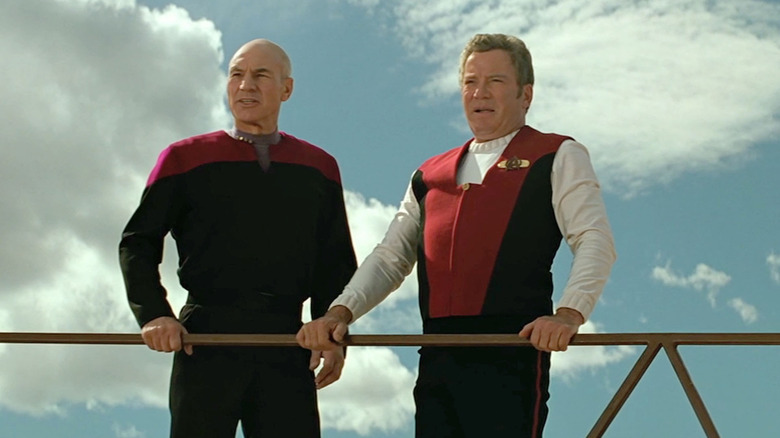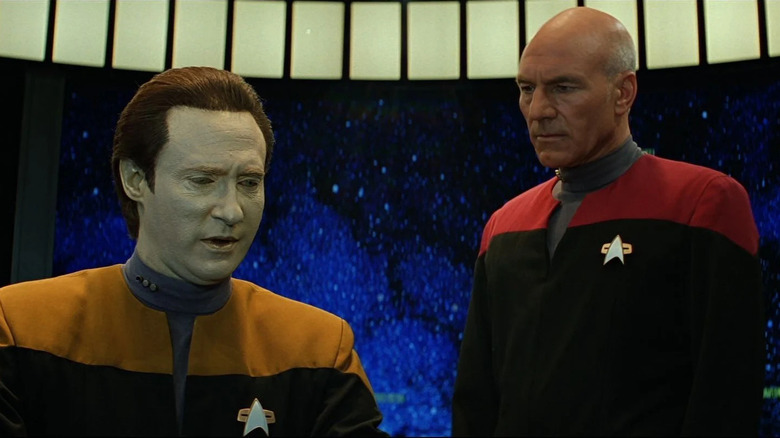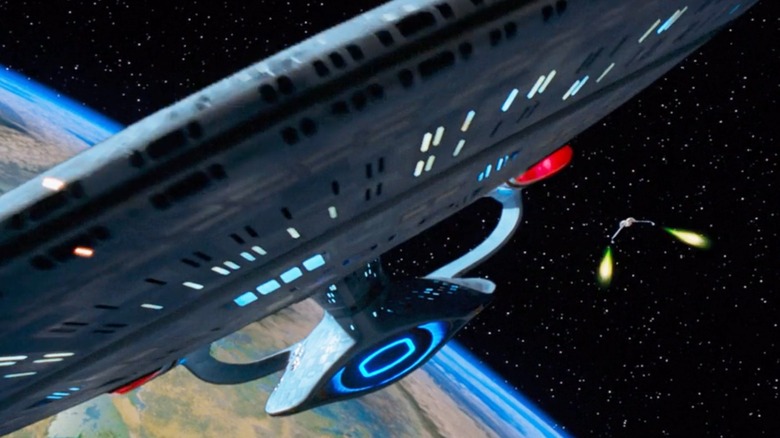Why Universal Allegedly Tried To Sink Star Trek: Generations Before It Even Released
Trekkies who were there in 1994 may remember the incredibly fast turn-around for "Star Trek: The Next Generation." The final episode of the series, "All Good Things..." aired on May 23, and the first feature film adaptation of the show, "Star Trek: Generations," was released in theaters on November 18. In the intervening six months, Trekkies would be able to tide themselves over with ten new episodes of "Deep Space Nine." Even though a seminal TV series in the "Star Trek" universe was coming to an end, there was no drought to suffer through.
Both Paramount and "Star Trek" executive producer Rick Berman were feeling apprehensive about "Generations." One can see their apprehension in Berman's choice of story: thanks to a magical temporal nexus, Captain Picard (Patrick Stewart) was able to meet up with Captain Kirk (William Shatner) who was presumed dead 87 years prior. The two of them teamed up to fistfight a mad rocket scientist (Malcolm McDowell) who wanted to destroy an inhabited planet. This "passing the torch" story was wholly unnecessary for "Next Generation" which had established its own identity perfectly well over its seven seasons.
It seems that Trekkies didn't like the story, even at the time. According to the oral history book "The Fifty-Year Mission: The Next 25 Years: From The Next Generation to J. J. Abrams," edited by Mark A. Altman and Edward Gross, "Generations" didn't test well. During early test screenings on the Paramount lot — which featured incomplete special effects and a temporary music track — audiences responded negatively, feeling that the last 15 minutes were bad. Paramount would be comfortable if "Generations" had tested with a 90% approval rating. It was much lower than that. Reshoots were needed.
It was then that Universal got involved in a minor smear campaign.
Don't look at 'Waterworld'
It's commonly known that many films, especially big Hollywood blockbusters, often undergo reshoots. Sometimes an error will be found in editing and the filmmakers have to go back and fill in a few moments of visual exposition they had forgotten. Often, certain scenes aren't working well, and sections of a movie will be re-written. It wasn't good news that "Generations" was testing poorly, but it certainly wasn't a scandal that Rick Berman felt the need to reshoot the final 15 minutes.
Regardless, the press began to zero in on "Generations" as ripe for salacious reporting. "The Fifty-Year Mission" posits that Universal was secretly driving the negative press. It seems that there had recently been a large migration of workers from Paramount to Universal, and the ex-Paramount employees were bitter about their old workplace. Some, it was theorized, might have even hated Rick Berman personally, seeing as he had so much control over Paramount's biggest entertainment franchise. As such, the Universal employees decided to "leak" stories about how Paramount was in massive trouble, and how "Generations" was going to be a major bomb.
It's worth noting that Universal was already providing material to the scandal sheets with the troubled production of "Waterworld." That film was notoriously expensive and required new sets to be built repeatedly after the old ones sank into the ocean. Shooting off the coast of Hawai'i cost way more than anticipated, and the talent spent far too much on accommodations. Universal likely wanted to deflect the negative "Waterworld" reporting toward Paramount's troubled production.
"Generations" experienced no major delays, and ultimately only cost $35 million. The "scandal" is forgotten. "Waterworld," meanwhile, cost $175 million. It's recalled to this day.
Generations did fine
Universal's efforts didn't work. While "Generations" needed some retooling, it wasn't a "troubled" production, as reporters liked to say. Internationally, "Generations" made about $118 million, and a sequel, "Star Trek: First Contact" was released in 1996. "Waterworld," meanwhile, ended up making an impressive $264 million, mitigating a lot of its unbearably large cost.
The only major scandal of "Generations" is, well, it isn't very good. As mentioned, the story involved passing Trek's legacy from Kirk to Picard when that had already been done seven years earlier. The script is also strange and the story is not terribly interesting. This had nothing to do with reshoots and everything to do with the script. The film has a 48% approval rating on Rotten Tomatoes, and I challenge you to find a Trekkie who names "Generations" as their favorite of the 13 "Star Trek" movies. Indeed, none of the four films based directly on "Star Trek: The Next Generation" are outstanding or expansive, and only one of them — "First Contact" — was a notable hit. Indeed, 2002's "Star Trek: Nemesis" remains the lowest-grossing "Star Trek" movie, even not adjusted for inflation. It seems "Next Generation" operated better on the small screen.
This non-scandal should remind readers that up-to-the-minute news about blockbuster reshoots isn't a sign of scandal, failure, or trouble. Many, many films undergo reshoots, sometimes even extensively, and still come out okay. Your favorite films in the Marvel Cinematic Universe have all undergone reshoots. Yes, sometimes the reshoots are so extensive as to be a cause for concern, but know that "troubled productions" aren't as common as the discourse might have you believe.


